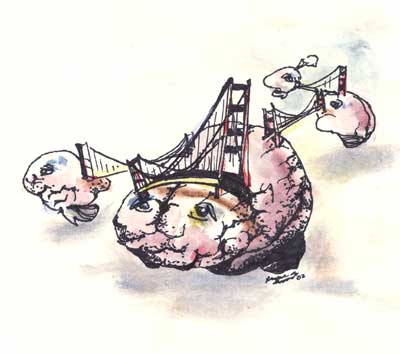Serendip is an independent site partnering with faculty at multiple colleges and universities around the world. Happy exploring!
Science, culture, education, and the brain: implications
 |
Science, culture, education, and the brain: 4th Annual Springer Forum on Cultural Studies of Science Education 24 March 2010 |
 |
Implications
For science/science education/education
Recognize/value individual differences, unconscious and conscious, both at starting points and in terms of where people get to. Make use of rather than try to eliminate differences. Support a process of continuing discovery of what has not yet been conceived, individually and collectively.
Parallel changes in thinking about the brain and about education
"Bio 202 is still about science as story, about the process of creating and revising understandings, but it is now, hopefully, more explicitly about using stories, both one's own and other peoples', to conceive new less wrong individual and shared stories, both by oneself and in interaction with others, both for oneself and for others." ... Evolution of science education as story telling and story revising
For cultural studies of science education
Recognize/value differences among people/approaches/disciplines, both at starting points and in terms of where people get to. Make use of rather than try to eliminate differences. Support a process of continuing discovery of what has not yet been conceived, individually and collectively.
"a goal is to bind the clusters, that is, to create social bonds and networks that connect social groups within a field, not by eliminating difference in favor of sameness, but by showing respect for difference" ... Kenneth Tobin
"cogenerative dialogue enabled us to move towards this ideal of “science for all” by providing a method of discourse and structured critical reflection from which we could explicitly define and negotiate not only our goals for teaching and learning, but our individual and collective responsibility for meeting these goals" ... Sonya Martin
For life
Recognize/value differences intrapersonally, interpersonally, and interculturally , both at starting points and in terms of where you yourself, others, and cultures get to. Make use of rather than try to eliminate differences. Support a process of continuing discovery of what has not yet been conceived, individually and collectively.
<----- Index


